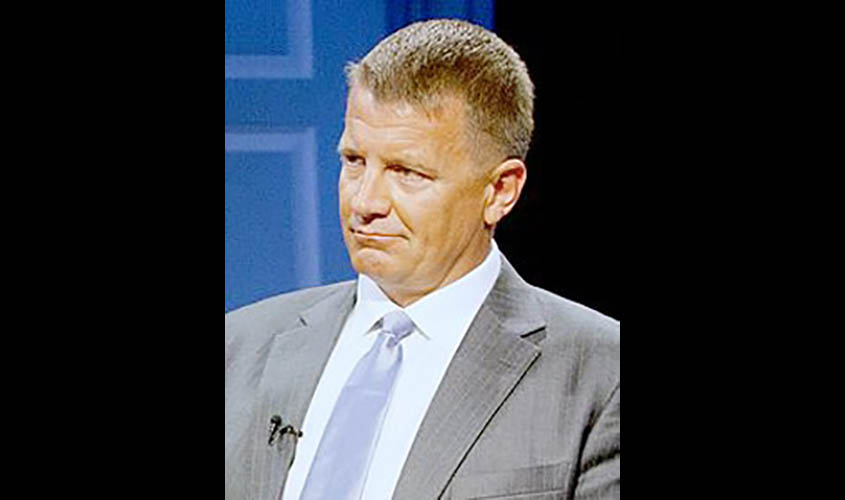Erik is Chairman of Frontier Services Group, which has marketed itself as a provider of security and logistic services to companies operating in ‘unstable countries’.
LONDON: How to solve the never-ending conflict in Afghanistan? This question has beset American Presidents since the aftermath of the 9/11 terrorist attack, when a gung-ho President George W. Bush misguidedly declared a “war on terror”. Seventeen years and $2.4 trillion (according to the Congressional Budget Office) later, the US still has more than 15,000 troops in Afghanistan supporting combat against the Taliban. Afghanistan is the longest war in American history, twice as long as the disastrous years America spent trying to defeat the Vietcong in Vietnam. Sometimes countries never learn.
This year an extra 800 US troops were added to the total, with the US Department of Defense insisting that its escalating pressure is sure to advance a negotiated solution to the fighting. Some hope! As the late Senator John McCain acerbically pointed out last year, in the past, 100,000 US troops in Afghanistan couldn’t solve the problem. Most experts agree that there can be no military solution in Afghanistan, only a diplomatic one.
The problem is that you can’t have a diplomatic solution unless sides talk to each other. In January, President Donald Trump declared, “We don’t want to talk with the Taliban”. However, despite these words, secret talks have been going on between US diplomats and a six-man Taliban delegation in Qatar, following the unprecedented three-day ceasefire during Eid celebrations in June, which was largely respected by both sides. Previous attempts at direct talks in Doha failed in 2013 and confidence of success in Qatar, although growing as the US mid-term elections approach, still remains low as the fighting continues.
Until a diplomatic solution is agreed, America’s best hope is to reduce both the number of troop casualties, currently running at 2,372 since 2001, and the huge cost of the war. Enter the billionaire “Prince of Darkness” with a solution.
Erik Prince is no stranger to the idea of military contracting, having made his name as a private military contractor in Iraq with his former company Blackwater, an operation that was connected with civilian deaths in Baghdad in 2007 (hence the nickname). He is now Chairman of Hong Kong listed Frontier Services Group (FGS), which has marketed itself as a provider of security and logistic services to companies operating in “unstable countries”. FGS has strong links to China and is expected to provide support to Chinese groups building infrastructure across Asia as part of the Belt and Road Initiative.
When I met up with Erik Prince in London last week he explained that currently US conventional forces, supported by some 30,000 contractors used for security and logistics, spend about nine months in Afghanistan. The first three months are spent by personnel familiarising themselves with their new environment; the second three months are spent in an operational capacity, and the final three months are spent in preparations to return home safely, rarely to return.
Prince insists that not only is this a disgracefully inefficient use of troops but it also allows insurgent Taliban to learn US battlefield tactics, including how forces patrol, communicate, target and respond. Worse still, the quick rotation allows the troops less time to learn the insurgent’s tactics. How better it would be to use a semi-permanent team of experienced ex-soldiers with their own aircraft, who could spend a longer period between home leave returning to the same Afghan unit in the same area.
Answering his critics who are concerned about accountability and ethics of using contractors instead of conventional troops, Prince insists that his plan is not privatisation. “This is not a private army, there is a very clear delineation of who’s in charge. Contract troops would work to a ‘Viceroy’, a special US envoy for the war, who would report directly to the President.”
It is well known that President Trump is growing increasingly frustrated with both the cost and minimal progress of the Pentagon’s operations in Afghanistan, so will he listen? Prince has two powerful cards to play: money and connections. In 2019, the US plans to spend $62 billion on its Afghan operations, more than the total UK defence budget. He calculates that if 2,000 US Special Forces remain in Afghanistan, together with 6,000 FGS contract personnel, supported by a 90-plane private air force and living and working with the Afghan troops under Afghan Rules of Engagement, the bill could be reduced to around $4 billion. This huge saving would be music to the ears of a businessman President, assuming he could be persuaded the scheme would work.
When Prince initially floated his idea in 2017 it had the backing of Trump’s former strategist Steven Bannon and the President’s son-in-law and senior advisor, Jared Kushner. However, US Secretary of Defense Jim Mattis and Secretary of State Mike Pompeo both oppose Prince’s plan, with a senior State Department official insisting that there’s “not a chance” it will be adopted. The Afghan President Ashraf Ghani has also opposed the idea. Could this kill the idea?
Prince, whose sister is Betsy DeVos, US Secretary of Education, remains undeterred and optimistic. During the 2016 Trump campaign he donated $250,000 to pro-Trump causes and developed good relations with the national security team during the transition. Now that his friend, National Security Advisor John Bolton, a man who is “open to new ideas”, has the ear of President Trump, Erik Prince remains confident that his plan will be adopted if the Qatar talks fail.
John Dobson worked in UK Prime Minister John Major’s Office between 1995 and 1998 and is presently Chairman of the Plymouth University of the Third Age.

